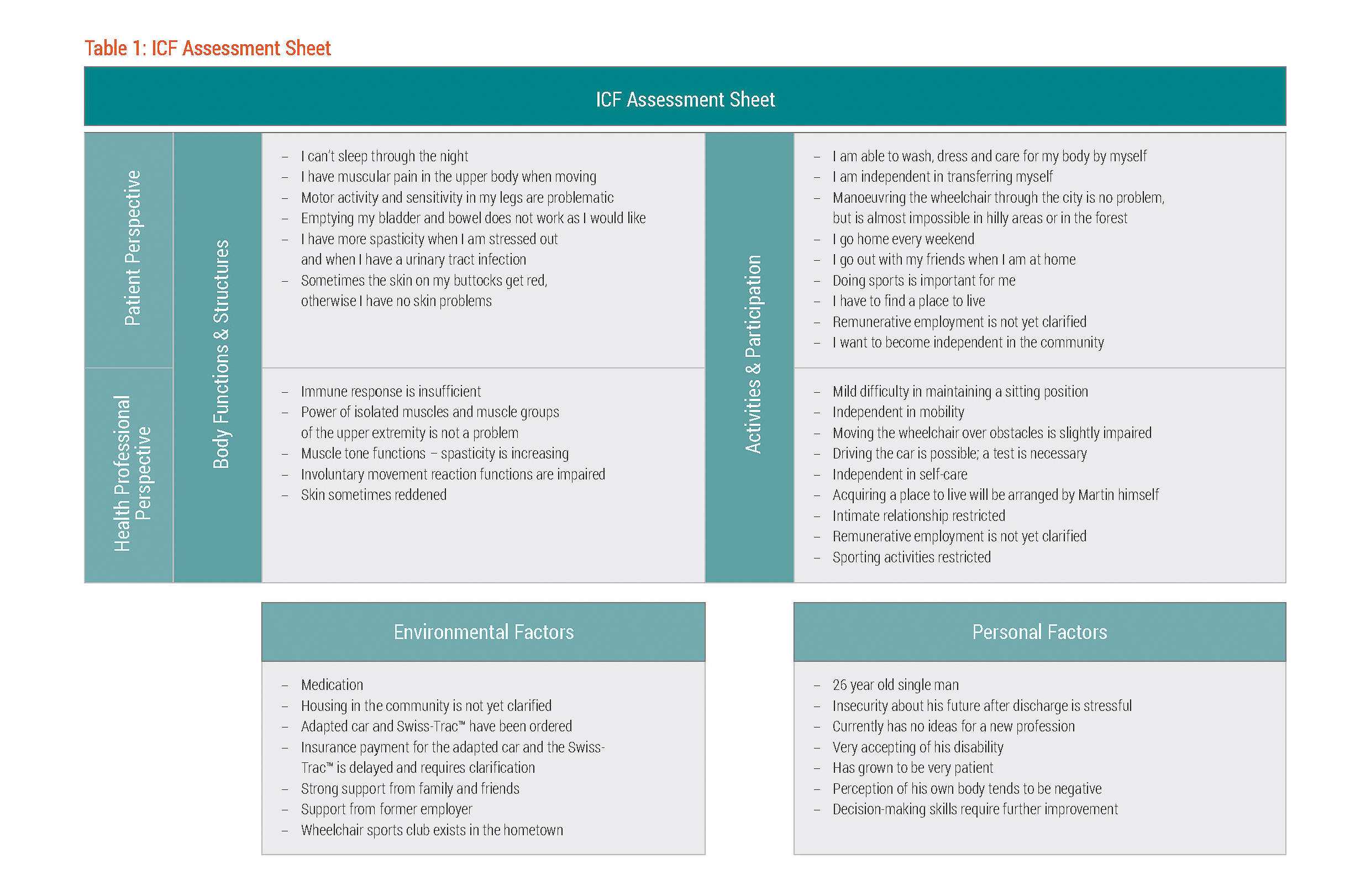Assessment
These problems and strengths are documented in the ICF Assessment Sheet, a listing of verbal statements made by Martin (in the section entitled “patient perspective”) and a summary of the results of the assessment completed by the rehabilitation team (in the section entitled “health professional perspective”). It also lists contextual factors that are relevant for the rehabilitation activities in Martin's new Rehab-Cycle®.

Table 1: ICF Assessment Sheet
The ICF Assessment Sheet shows the problems and strengths in all of the components of the International Classification of Functioning, Disability and Health (ICF)4 – body functions and structures, activities and participation, environmental and personal factors.
It shows that some body functions and structures related to movement i.e. spasticity and pain continued to be present. These made it difficult for Martin to move parts of his body.
While he was independent in transferring himself, wheelchair navigation, washing and dressing, etc. – all aspects of activities and participation that would ease his return home, Martin remained concerned about his future housing situation. Before the accident Martin had been living with a roommate in a fifth-floor apartment for a long time. Since this apartment was not wheelchair accessible, he had to move. Where and what kind of housing would be suitable for Martin was unclear.
Moreover, while Martin was able to manoeuver his wheelchair independently within an urban environment, wheelchair mobility continued to pose a problem in hilly and forested environments such as where his family lived. This consequently made family visits a challenge. However, the purchase of his own Swiss-Trac™, a motorized device for facilitating wheelchair mobility, was intended to address this problem.
With regard to social participation, Martin returned home every weekend and went out with friends. He also indicated that he would like to participate in sports activities again, as this remained to be Martin's main recreational interest. The rehabilitation team assessment showed that Martin's participation in sporting activities was restricted.
""...it was essential that vocational rehabilitation activities continued in order to concretize Martin's return to work options.""
Although Martin was successful in meeting his vocational reintegration goal in the first Rehab-Cycle®, the target set for this goal was modest. It was also clear at the end of the first Rehab-Cycle® that it was essential that vocational rehabilitation (VR) activities continued in order to concretize Martin's return to work options. This was reflected in Martin's statement and in the rehabilitation team's observation that “remunerative employment [was] not yet clarified”.
Martin’s personal factors offered some insight on the personal resources that may have factored in his reintegration efforts. On one hand, he was very accepting of his disability and showed a high level of patience that he had developed over several months of rehabilitation. On the other hand, Martin still needed to strengthen his decision-making skills, despite improvements made in the first Rehab-Cycle®. In addition, he experienced stress when thinking about the future, specifically about finding a new place to live and a new profession.
""...he experienced stress when thinking about the future, specifically about finding a new place to live and a new profession.""
The ICF Assessment Sheet additionally shows the environmental factors that presented both opportunities and obstacles. Opportunities or facilitating environmental factors included an adapted car that was ordered, a wheelchair sports club that was identified in his hometown, and an encouraging statement of support from Martin’s former employer who offered Martin a possible vocational opportunity. Additional supports came from his family and friends.
Unfortunately, there were also other environmental factors that presented Martin with obstacles to his community reintegration – the insurance payments for both his adapted car and the Swiss-Trac™ were delayed and had to be clarified.
The items documented on the ICF Assessment Sheet served as the basis for creating a functioning profile, that in turn served as the basis for setting goals and for identifying targets to be addressed by interventions during Martin's new Rehab-Cycle®.